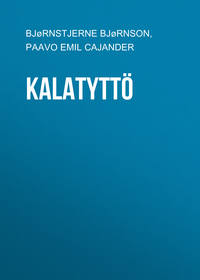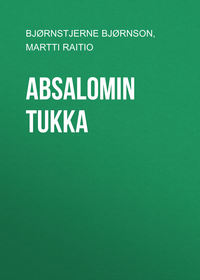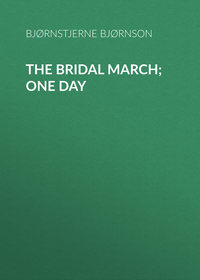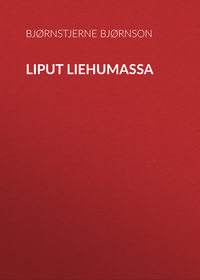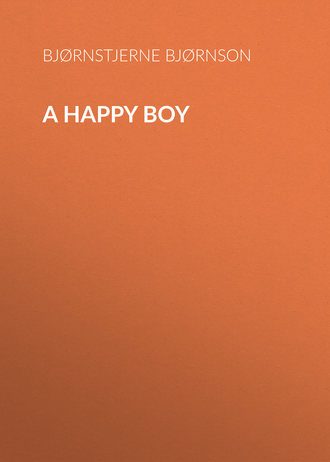 полная версия
полная версияA Happy Boy
"Who is it, then?" asked others. "Who is it? Yes; who is it?"
"He will find that out who has the number," replied the school-master, sternly. He would have no more questions. "Now go home nicely, children. Give thanks to your God and gladden your parents. Thank your old school-master too; you would have been in a pretty fix if it had not been for him."
They thanked him, laughed, and went their way jubilantly, for at this moment when they were about to go home to their parents they all felt happy. Only one remained behind, who could not at once find his books, and who when he had found them sat down as if he must read them over again.
The school-master went up to him.
"Well, Oyvind, are you not going with the rest?"
There was no reply.
"Why do you open your books?"
"I want to find out what I answered wrong to-day."
"You answered nothing wrong."
Then Oyvind looked at him; tears filled his eyes, but he gazed intently at the school-master, while one by one trickled down his cheeks, and not a word did he say. The school-master sat down in front of him.
"Are you not glad that you passed?"
There was a quivering about the lips but no reply.
"Your mother and father will be very glad," said the school-master, and looked at Oyvind.
The boy struggled hard to gain power of utterance, finally he asked in low, broken tones,—
"Is it—because I—am a houseman's son that I only stand number nine or ten?"
"No doubt that was it," replied the school-master.
"Then it is of no use for me to work," said Oyvind, drearily, and all his bright dreams vanished. Suddenly he raised his head, lifted his right hand, and bringing it down on the table with all his might, flung himself forward on his face and burst into passionate tears.
The school-master let him lie and weep,—weep as long as he would. It lasted a long time, but the school-master waited until the weeping grew more childlike. Then taking Oyvind's head in both hands, he raised it and gazed into the tear-stained face.
"Do you believe that it is God who has been with you now," said he, drawing the boy affectionately toward him.
Oyvind was still sobbing, but not so violently as before; his tears flowed more calmly, but he neither dared look at him who questioned nor answer.
"This, Oyvind, has been a well-merited recompense. You have not studied from love of your religion, or of your parents; you have studied from vanity."
There was silence in the room after every sentence the school-master uttered. Oyvind felt his gaze resting on him, and he melted and grew humble under it.
"With such wrath in your heart, you could not have come forward to make a covenant with your God. Do you think you could, Oyvind?"
"No," the boy stammered, as well as he was able.
"And if you stood there with vain joy, over being number one, would you not be coming forward with a sin?"
"Yes, I should," whispered Oyvind, and his lips quivered.
"You still love me, Oyvind?"
"Yes;" here he looked up for the first time.
"Then I will tell you that it was I who had you put down; for I am very fond of you, Oyvind."
The other looked at him, blinked several times, and the tears rolled down in rapid succession.
"You are not displeased with me for that?"
"No;" he looked up full in the school-master's face, although his voice was choked.
"My dear child, I will stand by you as long as I live."
The school-master waited for Oyvind until the latter had gathered together his books, then said that he would accompany him home. They walked slowly along. At first Oyvind was silent and his struggle went on, but gradually he gained his self-control. He was convinced that what had occurred was the best thing that in any way could have happened to him; and before he reached home, his belief in this had become so strong that he gave thanks to his God, and told the school-master so.
"Yes, now we can think of accomplishing something in life," said the school-master, "instead of playing blind-man's buff, and chasing after numbers. What do you say to the seminary?"
"Why, I should like very much to go there."
"Are you thinking of the agricultural school?"
"Yes."
"That is, without doubt, the best; it provides other openings than a school-master's position."
"But how can I go there? I earnestly desire it, but I have not the means."
"Be industrious and good, and I dare say the means will be found."
Oyvind felt completely overwhelmed with gratitude. His eyes sparkled, his breath came lightly, he glowed with that infinite love that bears us along when we experience some unexpected kindness from a fellow-creature. At such a moment, we fancy that our whole future will be like wandering in the fresh mountain air; we are wafted along more than we walk.
When they reached home both parents were within, and had been sitting there in quiet expectation, although it was during working hours of a busy time. The school-master entered first, Oyvind followed; both were smiling.
"Well?" said the father, laying aside a hymn-book, in which he had just been reading a "Prayer for a Confirmation Candidate."
His mother stood by the hearth, not daring to say anything; she was smiling, but her hand was trembling. Evidently she was expecting good news, but did not wish to betray herself.
"I merely had to come to gladden you with the news, that he answered every question put to him; and that the priest said, when Oyvind had left him, that he had never had a more apt scholar."
"Is it possible!" said the mother, much affected.
"Well, that is good," said his father, clearing his throat unsteadily.
After it had been still for some time, the mother asked, softly,—
"What number will he have?"
"Number nine or ten," said the school-master, calmly.
The mother looked at the father; he first at her, then at Oyvind, and said,—
"A houseman's son can expect no more."
Oyvind returned his gaze. Something rose up in his throat once more, but he hastily forced himself to think of things that he loved, one by one, until it was choked down again.
"Now I had better go," said the school-master, and nodding, turned away.
Both parents followed him as usual out on the door-step; here the school-master took a quid of tobacco, and smiling said,—
"He will be number one, after all; but it is not worth while that he should know anything about it until the day comes."
"No, no," said the father, and nodded.
"No, no," said the mother, and she nodded too; after which she grasped the school-master's hand and added: "We thank you for all you do for him."
"Yes, you have our thanks," said the father, and the school-master moved away.
They long stood there gazing after him.
CHAPTER VII
The school-master had judged the boy correctly when he asked the priest to try whether Oyvind could bear to stand number one. During the three weeks which elapsed before the confirmation, he was with the boy every day. It is one thing for a young, tender soul to yield to an impression; what through faith it shall attain is another thing. Many dark hours fell upon Oyvind before he learned to choose the goal of his future from something better than ambition and defiance. Often in the midst of his work he lost his interest and stopped short: what was it all for, what would he gain by it?—and then presently he would remember the school-master, his words and his kindness; and this human medium forced him to rise up again every time he fell from a comprehension of his higher duty.
In those days while they were preparing at Pladsen for the confirmation, they were also preparing for Oyvind's departure for the agricultural school, for this was to take place the following day. Tailor and shoemaker were sitting in the family-room; the mother was baking in the kitchen, the father working at a chest. There was a great deal said about what Oyvind would cost his parents in the next two years; about his not being able to come home the first Christmas, perhaps not the second either, and how hard it would be to be parted so long. They spoke also of the love Oyvind should bear his parents who were willing to sacrifice themselves for their child's sake. Oyvind sat like one who had tried sailing out into the world on his own responsibility, but had been wrecked and was now picked up by kind people.
Such is the feeling that humility gives, and with it comes much more. As the great day drew near he dared call himself prepared, and also dared look forward with trustful resignation. Whenever Marit's image would present itself, he cautiously thrust it aside, although he felt a pang in so doing. He tried to gain practice in this, but never made any progress in strength; on the contrary, it was the pain that grew. Therefore he was weary the last evening, when, after a long self-examination, he prayed that the Lord would not put him to the test in this matter.
The school-master came as the day was drawing to a close. They all sat down together in the family-room, after washing and dressing themselves neat and clean, as was customary the evening before going to communion, or morning service. The mother was agitated, the father silent; parting was to follow the morrow's ceremony, and it was uncertain when they could all sit down together again. The school-master brought out the hymn-books, read the service, sang with the family, and afterwards said a short prayer, just as the words came into his mind.
These four people now sat together until late in the evening, the thoughts of each centering within; then they parted with the best wishes for the coming day and what it was to consecrate. Oyvind was obliged to admit, as he laid himself down, that he had never gone to bed so happy before; he gave this an interpretation of his own,—he understood it to mean: I have never before gone to bed feeling so resigned to God's will and so happy in it. Marit's face at once rose up before him again, and the last thing he was conscious of was that he lay and examined himself: not quite happy, not quite,—and that he answered: yes, quite; but again: not quite; yes, quite; no, not quite.
When he awoke he at once remembered the day, prayed, and felt strong, as one does in the morning. Since the summer, he had slept alone in the attic; now he rose, and put on his handsome new clothes, very carefully, for he had never owned such before. There was especially a round broadcloth jacket, which he had to examine over and over again before he became accustomed to it. He hung up a little looking-glass when he had adjusted his collar, and for the fourth time drew on his jacket. At sight of his own contented face, with the unusually light hair surrounding it, reflected and smiling in the glass, it occurred to him that this must certainly be vanity again. "Yes, but people must be well-dressed and tidy," he reasoned, drawing his face away from the glass, as if it were a sin to look in it. "To be sure, but not quite so delighted with themselves, for the sake of the matter." "No, certainly not, but the Lord must also like to have one care to look well." "That may be; but He would surely like it better to have you do so without taking so much notice of it yourself." "That is true; but it happens now because everything is so new." "Yes, but you must gradually lay the habit aside."—He caught himself carrying on such a self-examining conversation, now upon one theme, now upon another, so that not a sin should fall on the day and stain it; but at the same time he knew that he had other struggles to meet.
When he came down-stairs, his parents sat all dressed, waiting breakfast for him. He went up to them and taking their hands thanked them for the clothes, and received in return a "wear-them-out-with-good-health."6 They sat down to table, prayed silently, and ate. The mother cleared the table, and carried in the lunch-box for the journey to church. The father put on his jacket, the mother fastened her kerchief; they took their hymn-books, locked up the house, and started. As soon as they had reached the upper road they met the church-faring people, driving and walking, the confirmation candidates scattered among them, and in one group and another white-haired grand-parents, who had felt moved to come out on this great occasion.
It was an autumn day without sunshine, as when the weather is about to change. Clouds gathered together and dispersed again; sometimes out of one great mass were formed twenty smaller ones, which sped across the sky with orders for a storm; but below, on the earth, it was still calm, the foliage hung lifeless, not a leaf stirring; the air was a trifle sultry; people carried their outer wraps with them but did not use them. An unusually large multitude had assembled round the church, which stood in an open space; but the confirmation children immediately went into the church in order to be arranged in their places before service began. Then it was that the school-master, in a blue broadcloth suit, frock coat, and knee-breeches, high shoes, stiff cravat, and a pipe protruding from his back coat pocket, came down towards them, nodded and smiled, tapped one on the shoulder, spoke a few words to another about answering loudly and distinctly, and meanwhile worked his way along to the poor-box, where Oyvind stood answering all the questions of his friend Hans in reference to his journey.
"Good-day, Oyvind. How fine you look to-day!" He took him by the jacket collar as if he wished to speak to him. "Listen. I believe everything good of you. I have been talking with the priest; you will be allowed to keep your place; go up to number one and answer distinctly!"
Oyvind looked up at him amazed; the school-master nodded; the boy took a few steps, stopped, a few steps more, stopped again: "Yes, it surely is so; he has spoken to the priest for me,"—and the boy walked swiftly up to his place.
"You are to be number one, after all," some one whispered to him.
"Yes," answered Oyvind, in a low voice, but did not feel quite sure yet whether he dared think so.
The assignment of places was over, the priest had come, the bells were ringing, and the people pouring into church. Then Oyvind saw Marit Heidegards just in front of him; she saw him too; but they were both so awed by the sacredness of the place that they dared not greet each other. He only noticed that she was dazzlingly beautiful and that her hair was uncovered; more he did not see. Oyvind, who for more than half a year had been building such great plans about standing opposite her, forgot, now that it had come to the point, both the place and her, and that he had in any way thought of them.
After all was ended the relatives and acquaintances came up to offer their congratulations; next came Oyvind's comrades to take leave of him, as they had heard that he was to depart the next day; then there came many little ones with whom he had coasted on the hill-sides and whom he had assisted at school, and who now could not help whimpering a little at parting. Last came the school-master, silently took Oyvind and his parents by the hands, and made a sign to start for home; he wanted to accompany them. The four were together once more, and this was to be the last evening. On the way home they met many others who took leave of Oyvind and wished him good luck; but they had no other conversation until they sat down together in the family-room.
The school-master tried to keep them in good spirits; the fact was now that the time had come they all shrank from the two long years of separation, for up to this time they had never been parted a single day; but none of them would acknowledge it. The later it grew the more dejected Oyvind became; he was forced to go out to recover his composure a little.
It was dusk now and there were strange sounds in the air. Oyvind remained standing on the door-step gazing upward. From the brow of the cliff he then heard his own name called, quite softly; it was no delusion, for it was repeated twice. He looked up and faintly distinguished a female form crouching between the trees and looking down.
"Who is it?" asked he.
"I hear you are going away," said a low voice, "so I had to come to you and say good-by, as you would not come to me."
"Dear me! Is that you, Marit? I shall come up to you."
"No, pray do not. I have waited so long, and if you come I should have to wait still longer; no one knows where I am and I must hurry home."
"It was kind of you to come," said he.
"I could not bear to have you leave so, Oyvind; we have known each other since we were children."
"Yes; we have."
"And now we have not spoken to each other for half a year."
"No; we have not."
"We parted so strangely, too, that time."
"We did. I think I must come up to you!"
"Oh, no! do not come! But tell me: you are not angry with me?"
"Goodness! how could you think so?"
"Good-by, then, Oyvind, and my thanks for all the happy times we have had together!"
"Wait, Marit!"
"Indeed I must go; they will miss me."
"Marit! Marit!"
"No, I dare not stay away any longer, Oyvind. Good-by."
"Good-by!"
Afterwards he moved about as in a dream, and answered very absently when he was addressed. This was ascribed to his journey, as was quite natural; and indeed it occupied his whole mind at the moment when the school-master took leave of him in the evening and put something into his hand, which he afterwards found to be a five-dollar bill. But later, when he went to bed, he thought not of the journey, but of the words which had come down from the brow of the cliff, and those that had been sent up again. As a child Marit was not allowed to come on the cliff, because her grandfather feared she might fall down. Perhaps she will come down some day, any way.
CHAPTER VIII
DEAR PARENTS,—We have to study much more now than at first, but as I am less behind the others than I was, it is not so hard. I shall change many things in father's place when I come home; for there is much that is wrong there, and it is wonderful that it has prospered as well as it has. But I shall make everything right, for I have learned a great deal. I want to go to some place where I can put into practice all I now know, and so I must look for a high position when I get through here. No one here considers Jon Hatlen as clever as he is thought to be at home with us; but as he has a gard of his own, this does not concern any one but himself. Many who go from here get very high salaries, but they are paid so well because ours is the best agricultural school in the country. Some say the one in the next district is better, but this is by no means true. There are two words here: one is called Theory, the other Practice. It is well to have them both, for one is nothing without the other; but still the latter is the better. Now the former means, to understand the cause and principle of a work; the latter, to be able to perform it: as, for instance, in regard to a quagmire; for there are many who know what should be done with a quagmire and yet do it wrong, because they are not able to put their knowledge into practice. Many, on the other hand, are skillful in doing, but do not know what ought to be done; and thus they too may make bad work of it, for there are many kinds of quagmires. But we at the agricultural school learn both words. The superintendent is so skillful that he has no equal. At the last agricultural meeting for the whole country, he led in two discussions, and the other superintendents had only one each, and upon careful consideration his statements were always sustained. At the meeting before the last, where he was not present, there was nothing but idle talk. The lieutenant who teaches surveying was chosen by the superintendent only on account of his ability, for the other schools have no lieutenant. He is so clever that he was the best scholar at the military academy. The school-master asks if I go to church. Yes, of course I go to church, for now the priest has an assistant, and his sermons fill all the congregation with terror, and it is a pleasure to listen to him. He belongs to the new religion they have in Christiania, and people think him too strict, but it is good for them that he is so. Just now we are studying much history, which we have not done before, and it is curious to observe all that has happened in the world, but especially in our country, for we have always won, except when we have lost, and then we always had the smaller number. We now have liberty; and no other nation has so much of it as we, except America; but there they are not happy. Our freedom should be loved by us above everything. Now I will close for this time, for I have written a very long letter. The school-master will read it, I suppose, and when he answers for you, get him to tell me some news about one thing or another, for he never does so of himself. But now accept hearty greetings from your affectionate son, O. THORESEN.
DEAR PARENTS,—Now I must tell you that we have had examinations, and that I stood 'excellent' in many things, and 'very good' in writing and surveying, but 'good' in Norwegian composition. This comes, the superintendent says, from my not having read enough, and he has made me a present of some of Ole Vig's books, which are matchless, for I understand everything in them. The superintendent is very kind to me, and he tells us many things. Everything here is very inferior compared with what they have abroad; we understand almost nothing, but learn everything from the Scotch and Swiss, although horticulture we learn from the Dutch. Many visit these countries. In Sweden, too, they are much more clever than we, and there the superintendent himself has been. I have been here now nearly a year, and I thought that I had learned a great deal; but when I heard what those who passed the examination knew, and considered that they would not amount to anything either when they came into contact with foreigners, I became very despondent. And then the soil here in Norway is so poor compared with what it is abroad; it does not at all repay us for what we do with it. Moreover, people will not learn from the experience of others; and even if they would, and if the soil was much better, they really have not the money to cultivate it. It is remarkable that things have prospered as well as they have. I am now in the highest class, and am to remain there a year before I get through. But most of my companions have left and I long for home. I feel alone, although I am not so by any means, but one has such a strange feeling when one has been long absent. I once thought I should become so much of a scholar here; but I am not making the progress I anticipated. What shall I do with myself when I leave here? First, of course, I will come home; afterwards, I suppose, I will have to seek something to do, but it must not be far away. Farewell, now, dear parents! Give greetings to all who inquire for me, and tell them that I have everything pleasant here but that now I long to be at home again. Your affectionate son, OYVIND THORESEN PLADSEN.
DEAR SCHOOL-MASTER,—With this I ask if you will deliver the inclosed letter and not speak of it to any one. And if you will not, then you must burn it.
OYVIND THORESEN PLADSEN.TO THE MOST HONORED MAIDEN, MARIT KNUDSDATTER NORDISTUEN AT THE UPPER HEIDEGARDS:—
You will no doubt be much surprised at receiving a letter from me; but you need not be for I only wish to ask how you are. You must send me a few words as soon as possible, giving me all particulars. Regarding myself, I have to say that I shall be through here in a year.
Most respectfully,
OYVIND PLADSEN.TO OYVIND PLADSEN, AT THE AGRICULTURAL SCHOOL:– Your letter was duly received by me from the school-master, and I will answer since you request it. But I am afraid to do so, now that you are so learned; and I have a letter-writer, but it does not help me. So I will have to try what I can do, and you must take the will for the deed; but do not show this, for if you do you are not the one I think you are. Nor must you keep it, for then some one might see it, but you must burn it, and this you will have to promise me to do. There were so many things I wanted to write about, but I do not quite dare. We have had a good harvest; potatoes bring a high price, and here at the Heidegards we have plenty of them. But the bear has done much mischief among the cattle this summer: he killed two of Ole Nedregard's cattle and injured one belonging to our houseman so badly that it had to be killed for beef. I am weaving a large piece of cloth, something like a Scotch plaid, and it is difficult. And now I will tell you that I am still at home, and that there are those who would like to have it otherwise. Now I have no more to write about for this time, and so I must bid you farewell. MARIT KNUDSDATTER. P.S.—Be sure and burn this letter.




